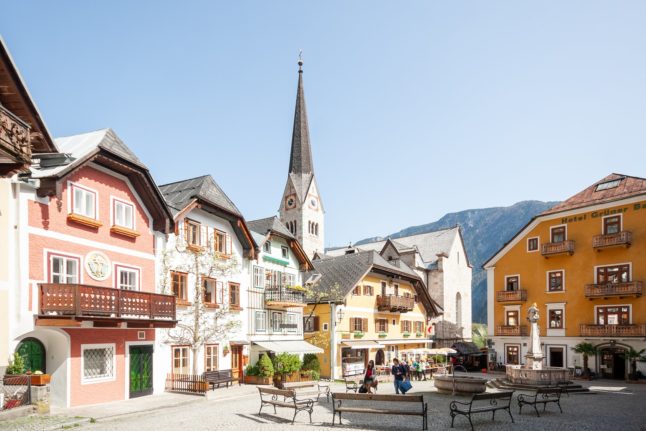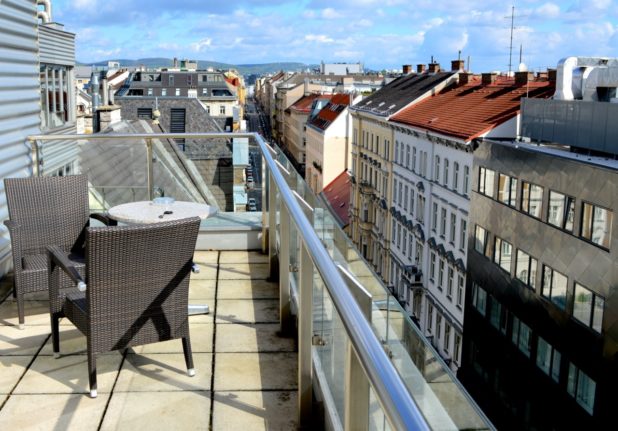Austria is a great place to live: fresh air, beautiful scenery and a high standard of living.
But for international residents it can be testing at times too – especially when it comes to navigating the local culture, making friends and saving money.
If you feel your life in Austria could do with a boost, then try these simple tips below.
You never know, it could just transform your experience here.
Always carry cash
Austrians love cash. They always have and probably always will.
Card payments and digital banking are gaining in popularity (especially since Covid-19), but Austria is a country built on tradition and many people are fully committed to cold hard cash.
In fact, it’s not uncommon to still come across places that will only accept cash. So to avoid feeling like a tourist, always carry cash.
READ ALSO: Why is cash so important to Austrians?
Learn some dialect words
Austria is officially a German-speaking country, but not everyone speaks Hochdeutsch (high German) in their day to day lives.
Instead, most regions have their own dialect, although there is no exact number for how many different dialects exist in Austria.
For international residents, this makes learning the language even harder because even though high German is taught in language schools across the country, many locals don’t usually speak it.
The best way to tackle it is to learn a few dialect words in the area where you live, and then use them when talking to local people. You might get laughed at if you get it wrong, but most of the time Austrians will appreciate the effort and do their best to make you feel welcome.
FOR MEMBERS: Austria vs Germany: Which country is better to move to?
Take time out for lunch
Austria has a healthier work/life balance than most English-speaking countries.
This even extends to the lunch break when people across the country (almost-religiously) sit down at midday to enjoy a freshly cooked lunch with others.
At first, this can seem restrictive. What if you want to have lunch at 1:30pm? Or you just want to be alone during the lunch break? That’s simply not the Austrian style when it comes to lunchtime.
The best advice is, don’t fight it. Do as the locals do and take some well-earned time out for lunch. You might even make some new friends in the process.
FOR MEMBERS: Tips for how to make friends in Austria from those who have done it
Make friends with Austrians
Austrians have a reputation for being reserved people, but often the opposite is true.
The main thing to remember is that Austrians typically don’t like small talk (see below for more on this), which can be a shock for people from places like the UK, New Zealand or the USA. But once you get to know Austrian people, they love to talk.
Some top tips for making friends in Austria include learning German, not being afraid to make the first move or to join a local sports club. In other words, get out of your comfort zone.
Not only will this make you feel more welcome and part of a community, but it will also help you to further understand the country.
Follow the Austrian news
Knowing what is happening in the place where you live can really help with understanding the local people and culture.
Current events are often a reflection of the country so it’s always a good idea to stay up to date – preferably with The Local.
Shop at cheaper supermarkets
Austria is well-known for its high cost of living and there is no sign of the prices coming down any time soon. If anything, prices will probably continue to rise.
A useful way to counteract the high cost of living is to shop in cheaper (or less desirable) supermarkets, like Hofer and Lidl – both of which stock a wide selection of Austrian and international products.
READ MORE: Six helpful tips to save money on food shopping in Austria
Call, don’t just email
When it comes to communicating at a business level, many people prefer to talk on the phone instead of by email.
The same applies if you’re looking for a new job or trying to connect with a particular person. Making a few phone calls can work wonders for your reputation and shows others that you’re not afraid to take the initiative.
This is in stark contrast to many other countries where the default mode of communication is usually email, and it’s another example of how Austrians like to do things their own way.
Relax in cafes
Coffee culture in Austria – and especially in Vienna – is more than just getting a daily dose of caffeine in the morning. It’s a way of life and something that UNESCO identified as an intangible cultural heritage in Austria’s capital city.
Coffee houses are also known as places to relax and spend some time over a cup or coffee (or two). There is often no rush to drink up and staff typically leave customers to their own devices until they ask for another drink.
As a result, Austrian coffee houses have long been meeting places for artists, intellectuals and politicians with Sigmund Freud, Ludwig van Beethoven, Gustav Klimt and Leon Trotsky just a few famous names to have graced coffee houses in Vienna.
READ ALSO: Who to call and what to say in an emergency in Austria
Support local businesses
A great way to get to know your neighbourhood is to support local businesses.
Pick up a coffee from the cafe down the road. Buy your bread from a nearby bakery. Go out for dinner to a local restaurant.
Independent business owners are often attentive and more likely to remember who their regular customers are, which means you can establish yourself as part of the local community.
During the pandemic some local smaller shops even kept high demand stock such as toilet paper and cooking oil aside for regular customers, telling others that there was simply none left.
READ MORE: Nine things you need to know when relocating to Vienna
Don’t be shocked by early morning drinking
Alcohol is deeply ingrained in Austrian culture but it tends to be consumed in a more moderate manner than in other countries, like the UK or Australia.
However, it’s not uncommon to see people in cafes having a glass of wine at around 10am on a weekday. No one seems to bat an eyelid, so just accept it as part of the culture.
Reader question: Is it legal to drink in public in Austria?
Enjoy nature (it’s free)
The advantage of Austria’s small size means that even if you live in a city, the countryside is not far away.
Take advantage of this proximity to nature to clear your thoughts, breathe fresh air and enjoy the beautiful scenery.
After all, you would have to search far and wide to find a place in Austria that is not picturesque.
‘Waldeinsamkeit’ in Austria: Five peaceful forest walks near Vienna
Carry a water bottle
Austria is home to world-class drinking water. So instead of paying for bottled water and contributing to more plastic waste, get a reusable flask and fill it up for free.
Or, when in a cafe or restaurant, simply ask for tap water (Leitungswasser) instead of mineral water.
Avoid small talk with strangers
In many English-speaking cultures, small talk is a guaranteed conversation starter and a way to avoid awkward silences.
In Austria however, small talk is not as common and people generally prefer to have meaningful conversations about topics they are interested in.
Austrians can also be more reserved around people they are not familiar with and shy away from asking personal questions until they know them better.
The best approach is to avoid small talk with strangers and stick to a simple “Servus” to avoid any embarrassing encounters.



 Please whitelist us to continue reading.
Please whitelist us to continue reading.
Member comments